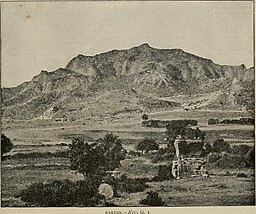Our look at the second chapter of the book of Revelation encompassed four of the seven letters that Jesus addressed to various churches that were active during the latter part of the first century. Revelation 3:1 now begins the fifth of those messages, and one that marks a departure from the preceding letters in this series. Jesus directed this fifth letter to the church in Sardis, a city that was located approximately thirty miles (48 km) south of Thyatira, the site of the church community that received His previous message.
 At one time, Sardis was reported to be one of the more prominent cities of the ancient world. The city was strategically positioned on an elevated ridge that was surrounded by mountainous cliffs that presented a formidable obstacle to any military force that might try to mount an invasion. Of course, “difficult to invade” is not the same as “impossible to invade,” but we’ll address that distinction in greater detail shortly.
At one time, Sardis was reported to be one of the more prominent cities of the ancient world. The city was strategically positioned on an elevated ridge that was surrounded by mountainous cliffs that presented a formidable obstacle to any military force that might try to mount an invasion. Of course, “difficult to invade” is not the same as “impossible to invade,” but we’ll address that distinction in greater detail shortly.
Sardis had once been a city of wealth, affluence, and commercial activity. However, that all changed in a single night in the year A.D. 17 when a severe earthquake destroyed large portions of the city. The destructive force of that earthquake was so immense that one ancient writer later stated that it caused vast mountains to collapse and human beings to be swallowed up by the earth. (1) Although the Roman government was said to have funded a substantial reconstruction effort, it appears that the city of Sardis never fully recovered from the devastating impact of that earthquake.
So what did that mean for the church in this city? Well, it meant that the members of the Christian community in Sardis were living in a place that had once been a thriving metropolitan area at the turn of the first century. But now with the dawn of the second century rapidly approaching, it was little more than a shadow of its former self.
This historical context adds meaning and significance to Jesus’ opening remarks in this letter…
“And to the angel of the church in Sardis write, ‘These things says He who has the seven Spirits of God and the seven stars: ‘I know your works, that you have a name that you are alive, but you are dead'” (Revelation 3:1).
One of the distinguishing features of Jesus’ message to the Christians at Sardis lies not in what He says, but in what He omits. We consider what Jesus left unsaid in His letter to the church at Sardis in our next study.
Image Credit: Sardis – Rev. III, 1 Internet Archive Book Images, No restrictions, via Wikimedia Commons
(1) The Annals of Tacitus. (n.d.). [2.47] https://www.earlychristianwritings.com/text/annals.html

